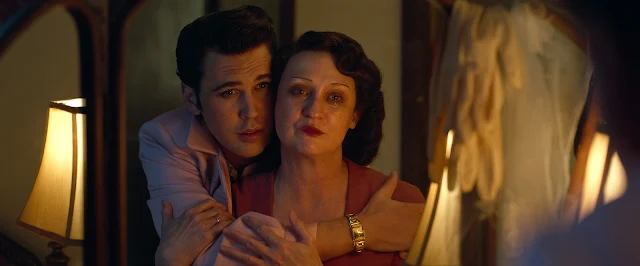Cast: Jason Schwartzman, Scarlett Johansson, Tom Hanks, Jeffrey Wright, Tilda Swinton, Bryan Cranston, Edward Norton, Adrien Brody, Liev Schreiber, Hope Davis, Stephen Park, Rupert Friend, Maya Hawke, Steve Carell, Matt Dillon, Hong Chau, Margot Robbie, Tony Revolori, Jake Ryan. Grace Edwards. Screenplay: Wes Anderson, Roman Coppola. Cinematography: Robert D. Yeoman. Production design: Adam Stockhausen. Film editing: Barney Pilling. Music: Alexandre Desplat.
On the Netflix series Heartstopper, a teenage boy works up the courage to ask a girl he likes (and who secretly likes him) to go on their first date. He takes her to a movie that he likes and she doesn't, and the date is a disaster. The key fact here is that the movie is Wes Anderson's Moonrise Kingdom (2012). In my day, a comparable move would have been to take a date to see Jacques Demy's The Umbrellas of Cherbourg (1964). Like Demy, Anderson makes movies that display an uncompromising sense of style. The only question is whether that style works for you or not, whether you think it betrays a lack of substance or opens vistas of meaning. In Anderson's case it's certainly a consistent style: an absence of closeups, long takes with characters artfully placed, actors who deliver their lines deadpan facing front, tricks like switching the screen from standard Academy ratio to widescreen and from monochrome to color. Sometimes Anderson's style works for me and sometimes it doesn't -- I love The Royal Tenenbaums (2001) and The Grand Budapest Hotel (2014), but I could barely sit through The French Dispatch (2021). In the case of Asteroid City, I still haven't made up my mind completely, but I'm leaning toward the favorable view. I think it captures something essential about the brutal innocence of 1950's America -- the film is set in 1955 -- and does it without clichés. There's an acidity of tone to the film that keeps it from becoming twee -- an adjective frequently applied to Anderson's movies. The performances of its all-star cast are often delightful: I particularly liked Bryan Cranston's performance as the TV host who serves as the narrator in the frame story. Cranston somehow manages to walk a line between Rod Serling and Walter Cronkite in his delivery. Scarlett Johansson and a bearded, pipe-smoking Jason Schwartzman manage to transcend the limitations of deadpan delivery as the film's romantic leads. Jeffrey Wright doesn't overplay the role of the pompous General Gibson, and there's a brief starry cameo by Margot Robbie. Asteroid City may be one of those films it's more rewarding to think about after you watch it, but watching it is fairly painless.















